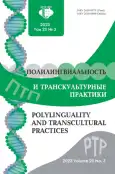Psycho-images of Language Units in the Consciousness of the Individual - the Basis of Bilingual and Intercultural Communication
- Autores: Dzhusupov M.1
-
Afiliações:
- Uzbek State University of World Languages
- Edição: Volume 20, Nº 3 (2023)
- Páginas: 484-496
- Seção: LANGUAGE CONSCIOUSNESS
- URL: https://journal-vniispk.ru/2618-897X/article/view/326684
- DOI: https://doi.org/10.22363/2618-897X-2023-20-3-484-496
- EDN: https://elibrary.ru/VATCQE
- ID: 326684
Citar
Texto integral
Resumo
The contact of languages and cultures forms bilingualism and biculturalism at different levels of their functioning. The purpose of the article is to analyze and describe the dual simultaneous formation and functioning of bilingual and bicultural communication based on the material of contact between the Kazakh and Russian languages. Language is the basis of bilingualism and biculturalism, since both bilingual and intercultural processes in an individual and society are carried out through the use of language units. Psycho-images of linguistic units and cultural symbols are formed in the consciousness of an individual of society, which are the basis of monolingual and monocultural communication within an ethnos. These national-linguistic-cultural psycho-images contribute to the formation of foreign, foreign-cultural psycho-images in the minds of the future bilingual, bicultural individual and society. The materials of the study were Kazakh (In general, Turkic), Russian linguistic and speech units, universal and national-specific cultural concepts and symbols, which, on the one hand, give rise to interference, on the other hand, facilitation, the latter facilitates the assimilation of non-native languages and cultures. Therefore, teaching a second language will be more effective if it is carried out when teaching and language material is presented in a harmonious combination of the language, which, in content, are logically closely interconnected with the cultural values of the foreign people. In the course of the study, methods of comparative analysis, opposition of minimal pairs, methods and techniques of inductive and deductive nature were used. The results of the scientific research are of theoretical and practical importance in the aspect of the formation of bilingualism of knowledge, skills and abilities of intercultural communication in the conditions of active Turkic-foreign (Kazakh-Russian) bilingualism and biculturalism.
Sobre autores
Mahanbet Dzhusupov
Uzbek State University of World Languages
Autor responsável pela correspondência
Email: mah.dzhusupov@mail.ru
ORCID ID: 0000-0002-2934-2333
Doctor of Philology, Professor, Honored Professor, Honorary Head of the Department of the Russian language
Kichik Halka str., 21-a, G-9A block, Tashkent, Uzbekistan, 100138Bibliografia
- Polivanov, E.D. 1968. Experience of a private method of teaching the Russian language to Uzbeks. 3rd ed. Tashkent: Okituvchi publ. Print. (In Russ.).
- Ter-Minasova ,S.G. 2000. Language and intercultural communication. Moscow: Dictionary. Print. (In Russ.).
- Weinreich, U. 2000. Language in contact. Status and research problems. Blagoveshchensk: BGK named after I.A. Baudouin de Courtenay publ. Print. (In Russ.).
- Dzhusupov, M. 2016. Interlingual and intercultural contact: concept, word, psycho-image, interference. Philological Sciences. Scientific reports of higher school 6: 22–34. Print. (In Russ.).
- Haugen, E. 1972. Language contact. In New in linguistics. Issue VI, Moscow: Progress. Pp. 61–80. Print. (In Russ.).
- Baitursynov, A. 1992. Tіl tagylymy (Kazakh tіlі men oku-agartuғa katysty enbekterі). Almaty: Ana Tili. Print. (In Kaz.)
- Baudouin de Courtenay, I.A. 1965. Phonology. In Baudouin de Courtenay, I.A. Selected works on general linguistics. Vol. 1. Publishing House of the Academy of Sciences of the USSR. Print. (In Russ.).
- Beldiyan, V.M. 1980. Scientific and methodological foundations for teaching the phonetics of the modern Russian language to students of national groups: Experience in system analysis. Tashkent: Fan publ. Print. (In Russ.).
- Reformatsky, A.A. 1970. From the history of Russian phonology. Feature article. Reader. Moscow: Nauka. Print. (In Russ.).
- Dzhusupov, M. 1991. Sound systems of Russian and Kazakh languages. Syllable. Interference. Pronunciation training. Tashkent: Fan. Print. (In Russ.).
- Vereshchagin, E.M. 2014. Psychological and methodological characteristics of bilingualism (bilingualism). Moscow, Berlin: Direct-Media.
- Dzhusupov, M. 2021. Speech interference as a result of a dual negative impact. RUDN Journal of Language Studies, Semiotics and Semantics 12 (1): 23–40. https://doi.org/10.22363/23132299-2021-12-1-23-40 Print. (In Russ.).
- Kopylenko, M.M., and Z.K. Akhmedzhanova. 1984. Phonetic interference in the Russian speech of the Kazakhs. Alma-Ata: Science. Print. (In Russ.).
- Yusupov, U.K. 2007. Theoretical Foundations of Comparative Linguistics. Tashkent: Fan. https://doi.org/10.22363/2313-2299-2021-12-1-23-40 Print. (In Russ.).
- Karlinsky, A.E. 1990. Fundamentals of the theory of interaction of languages. Alma-Ata: Gylym. Print. (In Russ.).
- Suleimenov, O.O. 2014. Word code. Introduction to the Universal Etymological Dictionary “1001 Words”. Almaty: Publishing House “Olzhas Library”. Print. (In Russ.).
- Dzhusupov, N.M. 2016. The theory of nomination in linguistic research: origins, trends, questions of interpretation. Bulletin of the Peoples’ Friendship University of Russia. Series Theory of language. Semiotics. Semantics 2: 41–50.
- Dzhusupov, N.M. 2018. Linguistic deviation as a special type of promotion: general linguistic and linguo-stylistic aspects. Sh. Ualikhanov. Philological series 1 (2): 54–58.
- Sinyachkin, V.P., and N.L. 2018. Sinyachkina. Multilingualism in the Republic of Kazakhstan: Viewpoint from the Outside. Polilinguality and transcultural practices 15 (3): 445–460. https://doi.org/10.22363/2618-897X-2018-15-3-445-460 Print. (In Russ.).
- Schukin, A.N. 2006. Linguodidactic encyclopedic dictionary. Moscow: Astrel: AST: Keeper publ. Print. (In Russ.).
- Safonova, V.V. 1974. The study of languages of international communication in the context of the dialogue of cultures and civilizations, Voronezh: “Sources”. Print. (In Russ.).
- Shcherba, L.V. 1974. On the concept of mixing languages. In Shcherba L.V. Language system and speech activity. Leningrad: Nauka. Print. (In Russ.).
- Zhukova, I.N., Lebedko M.G., Proshina, Z.G., Yuzefovich N.G. Dictionary of terms of intercultural communication. Moscow: Flinta publ. Print. (In Russ.).
- Zamakhshari Mahmud. 2008. The Muqaddimat al-adab: A Facsimile Reproduction of the Quadrilingual Manuscript (Arabic, Persian, Chaqatoy and Mongol). Tokio. Print.
- Vezhbitskaya, A. 1996. Language. Culture. Cognition. Moscow: Russian dictionaries. Print. (In Russ.).
- Vereshchagin, E.M., and V.G. Kostomarov. 2005. Language and culture. Three linguocultural concepts: lexical background, speech-behavioral tactics and sapientema. Edited and with an afterword by Academician Yu.S. Stepanov. Moscow: Indrik publ. Print. (In Russ.).
Arquivos suplementares









